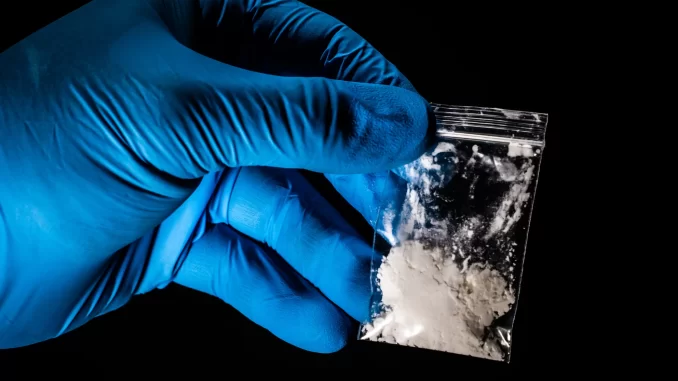
A Uniondale man was sentenced to 12 years in prison for his role in a major narcotic trafficking ring that operated in the Hempstead area.
On October 17, 2020, Orlando Ramsay was pulled over with approximately 350 grams of cocaine in his vehicle on his way to deliver the narcotics to a co-defendant. A search warrant executed at his residence on October 18, 2020, recovered:
- Approximately 1,500 grams of cocaine (1.5 kilograms)
- Approximately 1 kilogram of heroin
- 200 grams of Morphine
- 12 grams of fentanyl
- Four firearms, including three loaded handguns and a shotgun
- $185,000 in cash
- Various drug paraphernalia
In total, the street value of the narcotics recovered from the search warrant was estimated to be approximately $500,000.
In October 2019, NCDA, the Federal Bureau of Investigation Long Island Gang Task Force, and the Bureau of Alcohol, Tobacco, Firearms and Explosives Long Island Field Division began an investigation into an increase of violence and drug-dealing in the Hempstead area. After several drug and gun purchases, the NCDA applied for electronic eavesdropping warrants in February 2020 for the purpose of identifying large-scale narcotic suppliers in the Hempstead area.
Ramsay was arrested October 17, 2020, by members of the Nassau County Police Department. Ramsay was one of several defendants who emerged as a major trafficker during the investigation. The crime of operating as a major trafficker requires the aggregate value of narcotics possessed or sold by the trafficker to exceed $75,000 during a period of six months or less.
These individuals allegedly acted as major suppliers to numerous smaller dealers in Nassau County and variously worked together to obtain and distribute narcotics, including heroin, fentanyl, and cocaine.
Prosecutors allege that drugs were trafficked from as far away as Puerto Rico, as well as California, Virginia, Pennsylvania, New Jersey, Massachusetts, and Connecticut.
Ramsay, 49, pleaded guilty on May 21, 2024, before Judge Teresa Corrigan to operating as a major narcotics trafficker (an A-I felony); three counts of first-degree criminal possession of a controlled substance (a Class A-I felony); second-degree criminal possession of a controlled substance (a Class A-II felony); seven counts of third-degree criminal possession of a controlled substance (a Class B felony); second-degree conspiracy (a Class B felony); three counts of second-degree criminal possession of a weapon (a Class C violent felony); three counts of third-degree criminal possession of a weapon (a Class D felony); three counts of Criminal Possession of a Firearm (a Class E felony); and possession of drug paraphernalia (a Class A misdemeanor).
Ramsay was sentenced on July 8, 2024 to 12 years in prison and five years post-release supervision.
“Orlando Ramsay was a major trafficker in a Hempstead narcotics ring that supplied dangerous opioids and other drugs to smaller dealers across Nassau County and promoted violence in and around Hempstead. The defendant was arrested in possession of drugs with a street value of more than $500,000 including a kilogram of heroin,” said Nassau County Anne Donnelly. “This defendant is one of the last to be sentenced as part of a multi-partner operation that resulted in the indictments of 40 individuals, including several major traffickers from Hempstead. I thank our many law enforcement partners for their work breaking up this dangerous outfit and making our communities safer.”
The investigation was called Operation Honeycomb because a large volume of drugs was packaged and stored at a defendant’s home, which was frequently referred to as the “honeycomb” by co-defendants in wiretapped calls.
When the COVID-19 Pandemic emerged in March 2020, the cost of cocaine began to vary widely, with demand vastly exceeding supply. Cocaine prices rose from approximately $32,000 per kilogram to a peak of $55,000 per kilogram in August 2020, resulting in skyrocketing street level prices up to $125 per gram. Because of narcotics shortages during the pandemic, dealers began mixing fentanyl with cocaine and heroin to increase the potency of their supply while using less cocaine.

